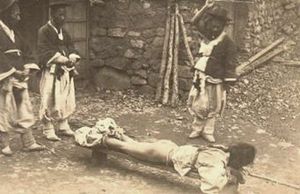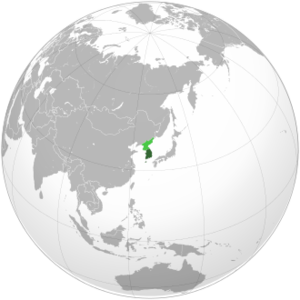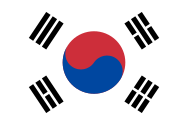South Korea
| Republic of Korea (South Korea) |
|
(and South_Korea's largest city) |
Source information is available at [ Sources ] |
South Korea, officially the Republic of Korea (ROK), is a country in East Asia. It constitutes the southern part of the Korean Peninsula and shares a land border with North Korea. About 25 million people, around half of the country's 51 million population, live in the Seoul Capital Area.
History
The Korean Peninsula was inhabited as early as the Lower Paleolithic period. Its first kingdom was noted in Chinese records in the early 7th century BCE. Following the unification of the Three Kingdoms of Korea into Silla and Balhae in the late 7th century, Korea was ruled by the Goryeo dynasty (918–1392) and the Joseon dynasty (1392–1897). The succeeding Korean Empire was annexed in 1910 into the Empire of Japan. Japanese rule in Korea ended following the former's surrender in World War II. Korea was divided into two zones: a northern zone occupied by the Soviet Union and a southern zone occupied by the United States. After negotiations on reunification failed, the latter became the Republic of Korea in August 1948, while the former became North Korea.
In 1950, a North Korean invasion began the Korean War, which saw extensive United States-led U.N. intervention in support of the South, while the North received support from China and the Soviet Union. After the war's end in 1953, the country's economy began to soar, recording the fastest rise in average GDP per capita in the world between 1980 and 1990. The June Struggle led to the end of authoritarian rule in 1987, and the country is now considered among the most advanced democracies in Asia, with high levels of press freedom. However, corruption, especially with chaebols[Note 1], as well as persistent political scandals involving both the public and private sectors, have become growing problems; all four living former South Korean presidents have been sentenced to prison for various crimes ranging from abuse of authority to bribery and embezzlement; with two still currently serving their sentences.
South Korea is a developed country and ranked as the seventh-highest country on the Human Development Index (HDI) in the Asia-Pacific region. It is a member of the OECD's Development Assistance Committee, the G20, and the Paris Club. Its economy ranks as the world's tenth-largest by nominal GDP. Its citizens enjoy one of the world's fastest Internet connection speeds and the densest high-speed railway network. South Korea was, in 2017, the world's 7th largest emitter of carbon emissions and the 5th largest emitter per capita. Since the 21st century, the country has been renowned for its globally influential pop culture supported by heavy government funding, particularly in music (K-pop), TV dramas, and cinema, a phenomenon referred to as the Korean Wave.
Spanking in South Korea
Judicial corporal punishment

Judicial corporal punishment was common in ancient Korea and was applied to both men and women. For males, the offender was tied to a low whipping bench in a lying position and was beaten with a type of long cane on the bare buttocks. Women received the punishment over wet clothing. In a variant called gonjang (곤장), which means big wooden paddle, the bench was in the shape of a horizontal cross, and the delinquent's arms were strapped to the sides such that he assumed a face-down spreadeagle position. See here for some photos.
School corporal punishment
In the 20th century, school corporal punishment fell out of fashion and was gradually banned in many countries, a trend that continues until the present day.
As of May 2008, South Korea permits corporal punishment in schools.
School corporal punishment, applied to both boys and girls, is widely practiced in South Korea as of now. Opinions on school corporal punishment are divided in the country, with some calling for it to be banned while others oppose its abolition. According to a study conducted in 2003, 70% of South Korean schools permit their teachers to use corporal punishment.
Traditionally, parents ceremonially present their children's teachers with symbolic canes ("stick of love") at the beginning of the school year, signifying a handing-over of responsibility for the discipline of their sons and daughters to the school. However, these 'canes' are not exactly canes, as they appear to be very thick and rigid sticks rather than the typical thin and whippy rattan cane traditionally used in Britain, and now in Southeast Asia. These 'canes' are highly like to cause bruises rather than stings if applied with force.
The official rules on the use of school corporal punishment are as such:
- For elementary and middle school students, the cane is up to 1 cm (0.39 ″) thick and only 50 cm (1 ft 8 in) long. The former may receive up to five strokes while the latter may receive ten.
- the maximum number of strokes for high school students is still ten, but the cane used is 1 cm (0.39 ″) thick and 60 cm (2.0 ′) long.
- Boys are to be punished on the buttocks while girls are to be punished on the thighs.
Although rules and regulations have been established, teachers sometimes violate them, and the government does not really enforce them, and abuse cases are quite common. Some teachers use larger sticks to punish students, and sometimes, they are seen punching students with fists and hitting them on the head. Mass punishments, where many students are punished together, are very common in schools.
During the punishment, the student usually adopts a lunge position (or push-up position) and receives the beating on his or her bottom over clothing. In other cases, the student may bend over a desk or a chair (as in the traditional British style), or stands upright, or kneels on the floor or on a chair. Hand-canings, beatings on the back, front and back of the thighs, bare calves, or foot-whipping, are also not uncommon. The implement used may not necessarily be the thick and rigid stick all the time, as teachers sometimes may use club-like sticks, broomsticks, paddles or baseball bats.
Domestic spanking
For the punishment of children, spanking of the buttocks is common, but also hitting the child's calves. The calves are spanked with an implement such as a cane, called hoichori (회초리). Calf-spanking seems to be a particularly Korean thing.
Children are spanked at home (80% of South Korean parents say they physically discipline their children).
Playful spanking
Many spanking photos and videos from South Korea show playful enactments of gonjang punishment. This "spanking play" (체벌놀이) had been also popular among children. On the internet, Korean students had been interested in spanking also join spanking blogs (체벌카페).[1]
South Korean spanking art
South Korean spanking artists include Eingyeo.
Punishment and bondage films with Korean actresses
In the pornography industry, there are a great many Korean and Korean-American actresses who have made a name for themselves by performing in X-rated sex films. A few have also dabbled in fetish videos involving bondage and spanking scenarios.
- Aili Gets Revenge (Spanking Sorority Girls), Kim Chi, revenge spanking, photos
- Asian Bondage Fantasies 3 (Bizarre Video), Kitty Jung (aka Kitty)
- Asian Bondage Fantasies 4 (Adult site) (Bizarre Video), Kitty Jung
- Asian Spanking Discipline (Bizarre Video, 2006), Annie Cruz, Lystra (aka Lystra Faith)
- Asian Spanking Sorority Girls (Spice XXX, 2008), Kitty Jung, Lystra (Faith)
- Be Good at Being You (Northern Spanking), Kim Chi caught cheating on an exam, photos
- In This House (Bobbie's DropSeats, DropSeat Prods.), Lystra (Faith)
- Joey Ray, Annie Cruz, Mark Davis (Adult site) (36 min.), Sexandsubmisison.com
- Kim Chi Poses As Teacher (Spanking Sorority Girls), photos
- Krazy Korean Stepmom (TheDaceyHarlot), Onyx Kim, POV, photos
- Kym Wilde's On The Edge 15 (Redboard Video, 1995), Kitty Yung
- The Laundry Room (Girls Boarding School), Jodie (video clip (Adult site))
- Madam Snow Punishes Kim Chi (Spanked Call Girls), Snow Mercy, photos
- Peeping Tom Punished (TheDaceyHarlot), Onyx Kim, voyeurism, POV, photos
- Spanking Asian Girls 3 (Pacific Force), Mia Smiles
- Teacher Snow Spanks Kim Chi (Spanking Sorority Girls), Snow Mercy, photos
- Tearful Witness To A Sobbing Correction (Punishments Only), Kim Chi, photos
In the 1980s and '90s, an actress named Mische (sometimes spelled Meechi or Mishi) did a series of CP videos for Nu-West/Leda Productions. These titles include: Harwood School for Girls, Ann Bowman Spanks Michshe and Kyrie (both co-starring Kiri Kelly), Mische and the Policewoman and Stephanie's Plaything - Mische. She also starred in A Paddling for Meechi for California Star.
Sources
Notes
- ↑ A chaebol - Korean: 재벌; lit. "rich family"; is a large industrial conglomerate that is run and controlled by a person or family
External links
- Article on judicial corporal punishment in Korea (with photos, in Korean)
- Article on judicial corporal punishment in Korea (with illustrations, in Korean)
- Article on corporal punishment in Korean schools (in English)
- Article on child punishment with a photo of a mother 'caning' her child's calves with a rolled-up newspaper (in Korean)
- Photo of a Korean girl with cane marks on her calves
- Movie still of a Korean woman caning a boy's calves (from a blog entry, in Korean)
- Report on corporal punishment in South Korea on the Global Initiative to End All Corporal Punishment of Children
- Korea: judicial floggings (article with photos) on World Corporal Punishment Research
Chat rooms • What links here • Copyright info • Contact information • Category:Root

